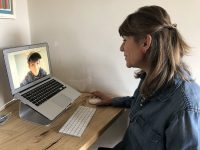The Old Mill Fund supporting Wiltshire Youth Adventure Trust
We set up The Old Mill Fund at the end of last year to help formalise our commitment to investing in local charities, community groups and individuals within the South West. Our focus is on three key areas; building brighter futures, reducing rural isolation and loneliness, and strengthening communities. We were delighted to support the Coronavirus Appeals in Somerset, Devon and Wiltshire as part of our Fund and wanted to share some of those stories from the charities and support groups that our fund has helped. Our story below is from Wiltshire Youth Adventure Trust.
 A Youth Adventure Trust volunteer mentor chatting to a young person
A Youth Adventure Trust volunteer mentor chatting to a young person
July 24, 2020
The Youth Adventure Trust works with troubled teenagers across Wiltshire, usually running outdoor adventure-based programmes and residential camps.
Thanks to the additional funding the Youth Adventure Trust has been able to set up an online mentoring service to support young people and help them carry on with their journey despite the current upheaval. For many, it’s the only hour in a fortnight when they are getting some positive interaction with an adult. The mentor provides consistency, helps them to identify tasks and objectives, and apply different coping strategies to achieve positive outcomes.
Louise Balaam from the charity told us how funding from The Old Mill Fund and Wiltshire Community Foundation’s Coronavirus Response Fund has helped them set up an online mentoring service to support young people through this difficult time.
‘We want to try and support young people through these times because they need us more than ever right now. The challenges that they are facing, the reasons why they were referred to us in the first place, haven’t gone away because of COVID-19, it has made it even harder to deal with those situations.
We have had to furlough staff so the grant has been absolutely brilliant because it’s allowed us to work with the most vulnerable young people on our books. We’ve got volunteer mentors in place, have identified 53 of the most vulnerable young people and are offering them fortnightly mentoring sessions.
We were really aware that as a result of the coronavirus crisis, many traditional ‘safety nets’ for young people have disappeared. Schools, for example, can no longer monitor ongoing situations, mental health services have substantial waiting lists, and social services face more challenges when entering family homes. We’ve worked with these young people for at least a year now, and we’ve helped them to identify their own objectives and different coping strategies, so we are really well placed to help them carry on with that journey because they and their families already trust us.
They suffer from incredibly low self-confidence, no self-belief or anxiety. They could be living in chaotic households or have parents with mental health issues or who are in and out of prison. There could be drug and alcohol misuse in the household, or they could be living in poverty. Some of our young people are living in care and we have a number of places reserved for young carers.
The mentor tries to have some consistency and set them challenges for the fortnight ahead. We had one person who is absolutely terrified of going outside now, so the mentor has managed to get them to go outside and draw a picture of a tree. It’s just helping them take small steps to give them more confidence to re-engage with the world as soon as we are allowed to.’
